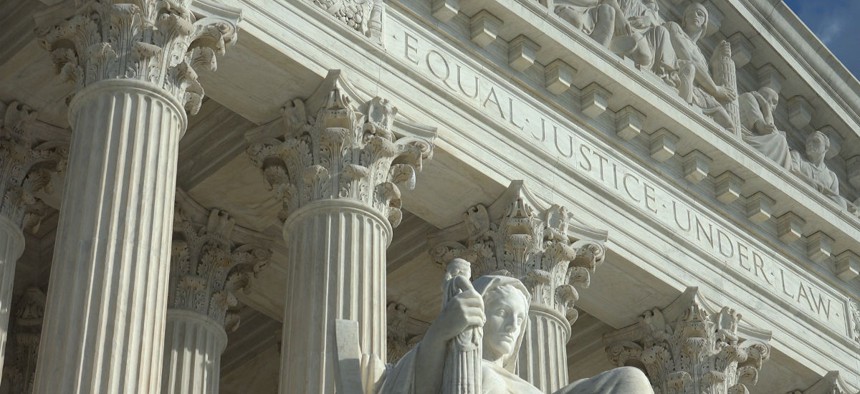
By bakdc / Shutterstock.com
Supreme Court Union Ruling Could Energize Both Sides in Fight Over Civil Service Reform
Observers predict that both conservatives and labor supporters will capitalize on the ruling stripping non-federal public sector unions of some dues collection authority, making civil service reform more difficult.
The Supreme Court’s decision Wednesday morning to invalidate state and local public sector unions’ authority to collect “agency fees” from non-member employees could further entrench both sides in the debate over the future of collective bargaining in the federal sector.
Although the 5-4 decision in Janus v. American Federation of State, County, and Municipal Employees, Council 31 only directly impacts public sector unions at the state and local level—federal employee unions already are barred from collecting dues or fees from nonmembers—federal union officials have decried the ruling in solidarity with affected unions.
“On behalf of the wealthiest 1 percent and special interest groups, the Supreme Court has attempted to strike the death knell for public-sector unions, but the workers themselves will ultimately decide their own fate,” said J. David Cox, national president of the American Federation of Government Employees. “Workers know the importance of unions in the workplace and they will survive. We need to come together as workers and use this as our moment to stand up, join the union, and organize like never before.”
Observers of labor-management relations in the federal government said that although there will be no immediate consequences at the federal level, the decision is likely to energize both labor groups and the Trump administration, which is in the midst of an effort to decimate unions’ influence on agency operations.
Donald Kettl, a professor in the University of Texas at Austin’s Lyndon B. Johnson School of Public Affairs at the LBJ Washington Center, said that Janus could accelerate the White House’s efforts to curb official time, a practice by which union employees are compensated for work on representational duties. Official time was devised as a compromise in the 1978 Civil Service Reform Act to allow unions to work on behalf of employees—as required by statute—despite being barred from collecting dues or fees from non-member workers.
The ruling "is consistent with recent Trump administration efforts to change bargaining and official time practices, in ways that weaken unions,” Kettl said. “The decision will surely embolden the administration to press further.”
Kettl said that the decision also is likely to cause unions and their supporters in Congress to “circle the wagons” in resisting any workplace changes proposed by the administration. A bipartisan group of lawmakers already has demanded Trump rescind his workforce executive orders.
“This deepens the difficulty of getting unions to join in genuine civil service reform,” he said.
Robert Tobias, former president of the National Treasury Employees Union and a distinguished practitioner in residence at American University’s School of Public Affairs, said he suspects unions will do what they always do under a hostile administration: organize.
“My sense is that this decision is going to re-energize federal sector unions to do the basic organizing needed to increase their membership,” he said. “All of the unions have been reporting a net membership gain since President Trump was elected, and it seems that this decision will only reaffirm the need for these efforts.”
That prediction is already proving prescient. Officials with the International Federation of Professional and Technical Engineers, a union that represents a mix of federal, public and private sector workers, told Government Executive ahead of the ruling that they had already begun to focus on membership growth.
“Membership has increased as we have been moving into the Janus world, and it’s going to continue to increase,” said Paul Shearon, IFPTE secretary treasurer. “One of the things we’ve done, and this is strategic in nature, is we have increased our communications member to member. We’ve spoken with every single member of our bargaining units and stressed that we’re all in this together.”
Perhaps more immediate of a threat for federal unions as they challenge Trump’s workforce executive orders, Tobias said, was a different controversial Supreme Court decision this week: Trump v. Hawaii, in which the court voted 5-4 to uphold the president’s travel ban.
“After all, the orders were an exercise of presidential power, and my guess is that, based on the immigration case, the government will use the immigration case to argue that the president has discretion in this area,” he said.







